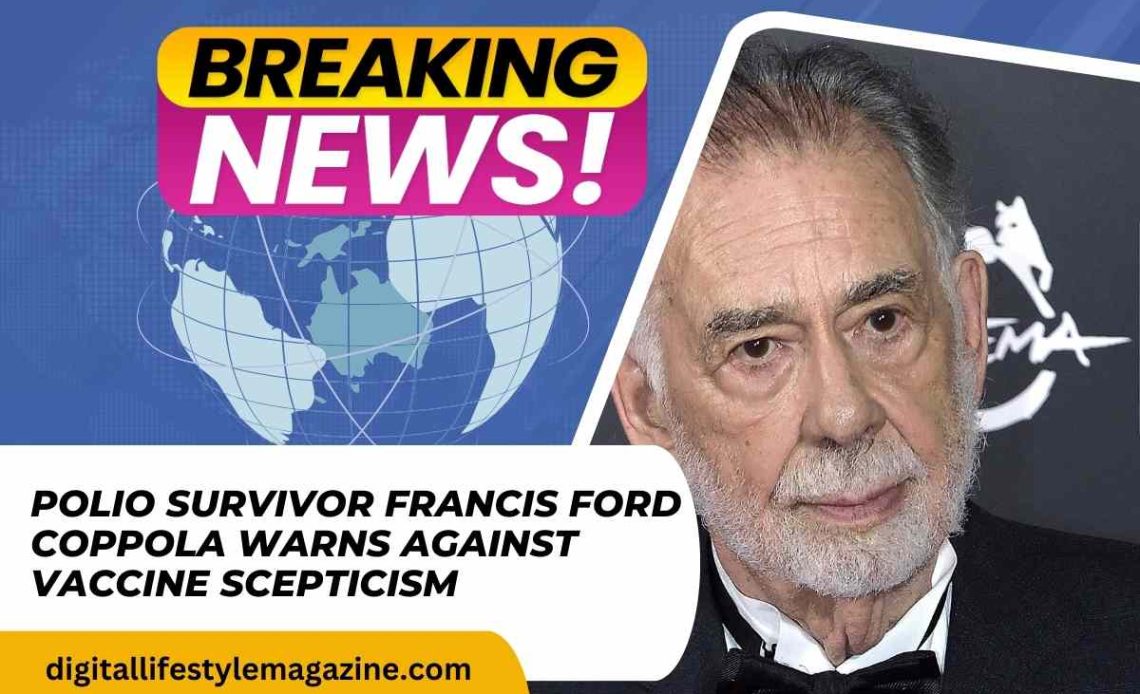
The 85-year-old, five-time Oscar winner Francis Ford Coppola is preparing for the global premiere of Megalopolis rather than wrapping up gifts.
As the movie premieres in South American theatres this week, he is doing interviews, but he took a moment to comment on a growing campaign to restrict vaccines as Donald Trump gets ready to return to the White House.
Table of Contents
Francis Ford Coppola Calls It “Absurd” That Trump Would “Reverse Course” on Vaccines
Francis Ford Coppola, who talked about his childhood experience with polio, is against the notion that President Donald Trump would “reverse course” on immunizations.
On December 18, MSNBC published a story detailing Trump’s long-standing opinions regarding vaccinations, including the claim that in 2015, before he had even been elected president, he questioned the effectiveness of flu shots.
The same piece cited Trump’s remarks at a recent news conference suggesting that he may be against school vaccination laws because he’s “not a big mandate person.”
Furthermore, on December 6, NPR said that Trump’s choice of RFK Jr., a purported anti-vaccine activist, to be the nation’s top health officer may “cause renewed, deadly epidemics of measles, whooping cough, and meningitis, or even polio.”
Francis Ford Coppola had been diagnosed with polio when he was a little boy. The Hollywood director was featured in a December 2015 piece in Global Citizen discussing how, at the age of nine, he was informed that he had polio in 1994.
His remarks about changing his mind about vaccines being “so absurd” stem from his personal experience with polio, which he described to Deadline as a “horror,” but which was fortunately over when the “wonderful Salk vaccine” was developed.
Francis Ford Coppola remembers receiving a polio diagnosis as a youngster
In a Sunday, December 22, interview with Deadline, Coppola addressed growing worries that the second Trump administration would restrict vaccine use if anti-vaccine activists like Robert F. Kennedy Jr. assume the position.
Francis Ford Coppola added in the same interview that Dr. Jonas Salk and Albert Sabin, the physicians who created the Salk vaccination for polio, gave the vaccine’s patents to the general public. He claimed that since firms now possess the patents for their vaccinations, it is no longer the same.
Coppola said, “People don’t understand that polio is a fever that just hits you for one night. You are only sick for one night.
The terrible effects of polio, like being unable to breathe so you have to be in an iron lung, or not being able to walk or being paralyzed, are the result of the damage of that one night of infection.”
He also talked about his hospital stay after receiving a childhood polio diagnosis. He added:
“I remember that night. I was feverish, and they took me to a hospital ward.
It was so crammed with kids that there were gurneys piled up three and four high in the hallways because there were so many more kids than there were beds in the hospital.”
The director of Megalopolis also remembered witnessing children in the iron lungs weeping for their parents and wondering why they were confined to steel cabinets.
He claimed that although he didn’t have to be in an iron lung, he felt sorry for other children who were in those devices. Nevertheless, Francis Ford Coppola recalls that his experience with polio was equally terrifying.
“I was looking around, and then when I tried to get out of bed, I fell on the floor, and I realized I couldn’t walk. I couldn’t get up. And I stayed in that ward for about 10 days before finally, my parents were able to take me home.”
Coppola knew he was paralyzed by the illness after he fell out of bed while attempting to get to his feet. Before his parents could bring him home, he was in the facility for ten days.
He concluded with, “To see [polio] go away, there are so many stories about the vaccine, how many lives it saved in an epidemic that was only becoming a bigger epidemic… It makes it so absurd, the idea that they would consider reversing course on vaccines now.”
Francis Ford Coppola’s remark follows the growing discussion over Donald Trump’s stance on vaccines.

